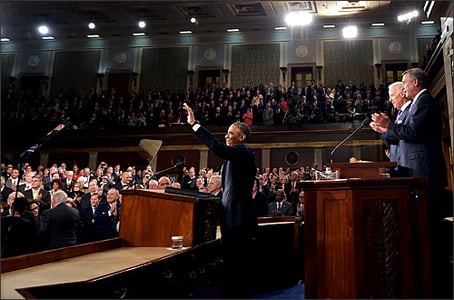
The morning after the President's 2013 State of the Union address, I sent an email to Teachstone staff with the subject line "Inspiring Words to Begin Your Day." As an early childhood advocate, I was elated to finally hear words so many of us in education had been waiting a lifetime to hear and couldn't wait to share them with my colleagues:
Tonight, I propose working with states to make high-quality preschool available to every child in America. Every dollar we invest in high-quality early education can save more than seven dollars later on—by boosting graduation rates, reducing teen pregnancy, even reducing violent crime. In states that make it a priority to educate our youngest children, like Georgia or Oklahoma, studies show students grow up more likely to read and do math at grade level, graduate high school, hold a job, and form more stable families of their own. So let's do what works, and make sure none of our children start the race of life already behind. Let's give our kids that chance.
Since that infamous announcement, those of us in early childhood have gone through many ups (the introduction of the Strong Start for America’s Children Act and the President’s Preschool for All initiative, to name a few) and downs (sequestration and the government shutdown). In the past year we've seen a significant increase in the visibility of early childhood education within research organizations, advocacy associations, foundations—even the business community.
The public is beginning to see what those of us in the early childhood community have known for so many years—providing high-quality early childhood education is good for kids, good for parents, good for communities, and essential in building a national commitment to education. Fortune 500 leaders, police chiefs, banking executives, the military, and the Chambers of Commerce have all issued reports about the impact early childhood education will have on workforce development, military readiness, fiscal security, and graduation rates. And political polling shows the early education has strong support by both Republicans and Democrats.
It's amazing what can happen in just one year.
Last night, waiting to catch a flight to the Opening Minds conference, I was eager to hear what Barack Obama would say about education in this year's State of the Union address. Watching the address on my phone (I love the wonders of technology when they work in your favor!), my expectations rose with the President's introductory words: “Today in America, a teacher spent extra time with a student who needed it, and did her part to lift America’s graduation rate to its highest level in more than three decades.” It seemed education would indeed be a unifying theme of the evening. Unfortunately, it was another 20 minutes before early childhood education was mentioned again:
Missed the President's 2014 SOTU address? You can watch it here.
Five years ago, we set out to change the odds for all our kids. . . . The problem is we’re still not reaching enough kids, and we’re not reaching them in time. That has to change. Research shows that one of the best investments we can make in a child’s life is high-quality early education. Last year, I asked this Congress to help states make high-quality pre-K available to every four year-old. As a parent as well as a President, I repeat that request tonight. But in the meantime, thirty states have raised pre-k funding on their own. They know we can’t wait. So just as we worked with states to reform our schools, this year, we’ll invest in new partnerships with states and communities across the country in a race to the top for our youngest children. And as Congress decides what it’s going to do, I’m going to pull together a coalition of elected officials, business leaders, and philanthropists willing to help more kids access the high-quality pre-K they need.
This was a solid statement in support of early childhood education—both the work that has been done and the work that needs to be done ahead. However, I can't help but feel it reveals the President's frustration toward Congress's lack of action to support children. His words "as Congress decides what it's going to do" speak volumes.
In the end, in an address that was almost 7,000 words long, only 136 were focused on early childhood education. I am disappointed, but I don't blame President Obama. He has had a difficult year and like a good leader, he is choosing carefully which battles to fight. I will continue my fight to ensure every child in the country has a high quality early childhood education, and I encourage you to do the same.
Remember my blog post Moving On After the Shutdown in which I recommended you set short- and long-term goals to refocus our national attention back towards early childhood education? The time is now to reset, refocus, and recommit. I said it before and believe it now more than ever: “The time to start is now. Our children’s futures are too precious to waste a moment. Pick a short-term task, a long-term task, and get started moving our agenda forward!”
